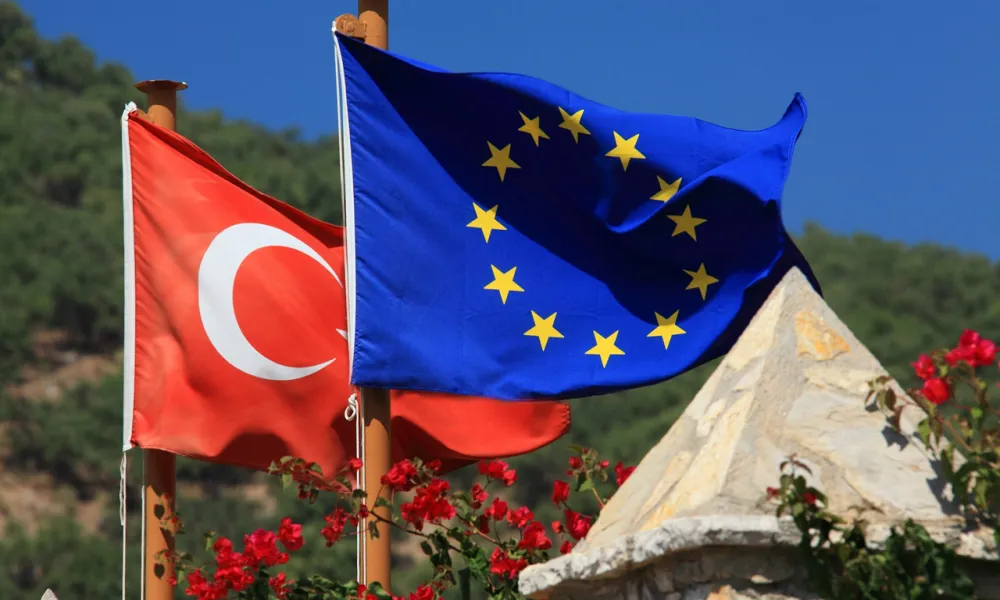The European Commission released its progress report on EU candidate countries on Tuesday, noting that accession negotiations with Türkiye remain at a standstill, as they have done since 2018.
According to the Commission, the EU has advanced relations with Türkiye in a phased, proportionate and reversible manner, engaging on shared priorities.
“The resumption of Cyprus settlement talks is a key element of cooperation. At the same time, the increasing legal actions against opposition figures and parties, alongside multiple other arrests, raise serious concerns about Türkiye's adherence to democratic values,” said a Commission statement.
“While dialogue on the rule of law remains central to EU-Türkiye relations, the deterioration of democratic standards, judicial independence, and fundamental rights has yet to be addressed. Accession negotiations with Türkiye remain at a standstill since 2018.”
Be a good neighbour – don't obstruct GSI
The 114-page report mentions Cyprus no less than 44 times. Under the chapter on ‘Good Neighbourly Relations and Regional Cooperation’, the Commission notes that Türkiye’s military exercises in the maritime zones of Cyprus continued.
“The flights of Turkish unmanned aerial vehicles in the flight information region and national airspace of the Republic of Cyprus also continued unabated. Türkiye continued upgrading its military drone base in Lefkoniko and naval base in Bogazi. Harassment of Cypriot fishing vessels and IUU fishing activities by Türkiye continued to be reported.”
Regarding the peace talks, the report notes that “the EU attaches particular importance” to their resumption and progress in the talks in further strengthening EU-Türkiye cooperation.
The EU welcomed the reappointment of the UN Secretary-General’s personal envoy in May 2025 while appointing its own special envoy for Cyprus the same month.
“It is important that Türkiye reaffirms its commitment to the UN-led settlement talks on Cyprus in line with the relevant UNSC Resolutions, including their external aspects. No unilateral actions should be taken that could raise tensions on the island and prevent the resumption of talks.”
The EU also calls Türkiye to immediately reverse the unilateral actions on Varosha and respect the relevant UN Security Council resolutions on the fenced-off area.
“Türkiye continued to impede survey activities for the Great Sea Interconnector, an EU project of common interest,” said the Commission progress report, noting that Türkiye insists on its plans for an electricity interconnector with the north.
EU- Türkiye relations
Türkiye has been an EU candidate country since 1999, with accession negotiations launched in 2004. Although they have been at a standstill since 2018, a positive agenda was launched in 2021, with High-Level Dialogues held between the EU and Türkiye on trade in 2024 and on the economy in 2025.
The EU is Türkiye’s largest trade partner, largest investor and largest provider of financial assistance. It offers a variety of programmes and instruments to support Türkiye’s development and EU accession process.
Between 2021 and 2024 the EU has allocated: €105 million for support to Civil Society; close to €115.7 million for environment and climate change; €70 million for support to health, education, employment, social protection and inclusion policies; and more than €210 million for agriculture and rural development.
Since 2011, the EU has provided close to €11 billion to assist refugees and host communities in Türkiye. The EU provides support for basic needs to over 1.6 million refugees, education services to close to 830,000 refugee children, and primary health care consultations in 40.7 million cases. Moreover it provided equipment, technical assistance and training for border protection.
Türkiye is the EU’s fifth largest trading partner. In 2024, 41% of Türkiye’s exported goods were destined for the EU, while 32.1% of the country’s imported goods originated from the EU. EU Foreign Direct Investment flows reached €5.33 billion in 2023. Overall trade volume reached a record high of almost €210 billion in 2024.
The Türkiye Investment Platform, established in 2022 by the EU to channel investments in the candidate country, aims to generate investments to the value of €2.4 billion by end-2027, in cooperation with international financial institutions.
On the EU’s common foreign and security policy, the Commission notes that Türkiye maintains a very low alignment rate with EU positions, while its foreign policy remains at odds with the EU priorities in certain issues.
Regarding EU sanctions against Russia, the so-called ‘false transit’ – exports originating from Türkiye but never reaching their destination – remains a concern.
Enlargement possible but no shortcuts
The Commission’s annual progress report covered all EU candidate countries: Montenegro, Albania, Ukraine, the Republic of Moldova, Serbia, North Macedonia, Bosnia and Herzegovina, Kosovo, Türkiye and Georgia.
The pace of their reforms, in particular in the areas of democracy, the rule of law and fundamental rights, directly impacts the speed of accession.
Commission President Ursula von der Leyen said the EU was “more committed than ever” to turning EU enlargement into a reality, but that enlargement is a merit-based process, and specific recommendations are made to all partners.
“With the right reforms and a strong political will, our partners can seize this opportunity,” she said.
EU foreign policy chief Kaja Kallas said that there were “no shortcuts for aspiring countries” but that new countries joining the EU by 2030 remains a realistic goal.
EU Enlargement Commissioner Marta Kos noted that 2025 saw “significant progress” on enlargement, singling out Montenegro, Albania, Ukraine and Moldova for advancing most on reforms.
